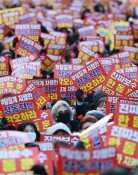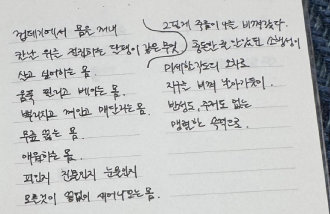Japan is poised to lose in dispute over comfort women
Japan is poised to lose in dispute over comfort women
Posted December. 30, 2013 04:52,
The comfort women issue, which seemed to have no resolution in sight, is showing clues to settlement. The Sankei Shimbun, a right-leaning newspaper in Japan, carried a report that is a far cry from its previous malign propaganda that would suggest comfort women participated voluntarily and were prostitutes who were paid more than generals at the time. The new report, dated December 6, suggests that Japan is losing over the comfort women issue in the U.S., a major battlefield of international public opinions. The key message of the story is how the comfort women issue is being perceived in the U.S., and suggests that the reality is far more pessimistic than they think.
According to the newspaper, at a meeting to generate economic vitality and jobs held at the Liberal Democratic Party headquarters in Niigata, Tokyo on October 31, former Deputy Secretary of State Richard Armitage made surprise remarks after concluding his lecture and Q&A session. Armitage said, If there was any single woman who mentally suffered, it is an issue that can never be forgiven, embarrassing Japanese parliamentarians in attendance.
Prof. Kevin Doak of Georgetown University in the U.S., who had been calling Abes visit to the Yasukuni Shrine understandable, also said Use of comfort women it itself is unethical and constitutes crime. Sankei, a flagship newspaper for the rightest group in Japan, thus graphically reports that how seriously right-leaning politicians and the Abe administration are lagging behind in international sense and fail to properly cope with.
The mood this writer feels in the U.S. is not different from this situation. In order to resolve the comfort women issue, the Japanese government decisively said, We are doubling budget for overseas public relations for next year, but the Japanese foreign ministry in charge of PR in the U.S. seems to be reluctant to do that. In other words, If Japan recklessly starts a PR campaign, the other party (Korea) could raise even louder voice, adding, Currently, the comfort women issue are only raised restrictively in areas with large ethnic Korean populations in the U.S. and Canada, but if Japan makes moves massively, Korean Americans and local residents who had little interest will join and spread the issue tremendously.
In fact, what the Japanese foreign ministry can do in the U.S. is just to play the firefighter role who seeks to extinguish fire by deploying diplomats from its consular offices or Tokyo, when it acquires information that Korean Americans are moving to erect a memorial stone or statue to remember comfort women also known as sex slaves. Basically, Japan has been focusing its efforts on urging U.S. leaders to not join in campaigns to erect memorial stones or statues, saying that Koreas right to seek compensation for wartime damage, including the comfort woman issue, was addressed through the 1965 Basic Korea-Japan Treaty and the Agreement between Japan and Korea Concerning Property and Claims and Economic Cooperation. However, it is facing an environment where even such efforts can no longer make any progress due to the Kono Statement that admits to the forced nature of comfort womens mobilization.
Senior officials at Japans foreign ministry to some extent expect that the movement to erect memorial stones and statues in the U.S. east and west coasts could spread like wild fire in the wake of the U.S. House of Representatives adoption of resolution on comfort women, and due to related grounds. This is because the campaign to erect memorial stones in New York, New Jersey, California and elsewhere by ethnic Koreans has given massive pressure.
On Abes visit to the Yasukuni Shrine, the U.S. media strongly criticized even by using such proactive expression as disappointment, in a shift from a passive stance saying that It is Japans internal issue in 2006 when former Prime Minister Junichiro Koizumi visited the shrine. Just like the Sankei Shimbun, which would make absurd statements on the comfort women issue, has changed, public opinions among the political circle and ordinary citizens in the U.S. are now shifting as well.
Japan should realize that distorted recognition of past history among its right-leaning group and that Prime Minister Abe is increasingly losing ground.







